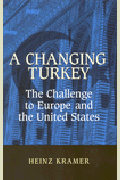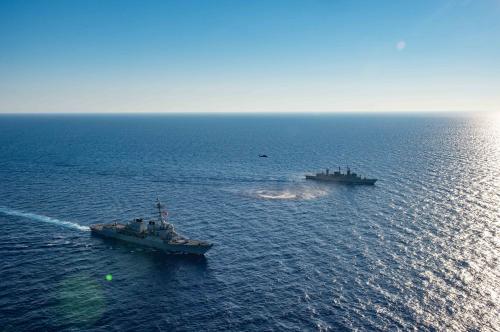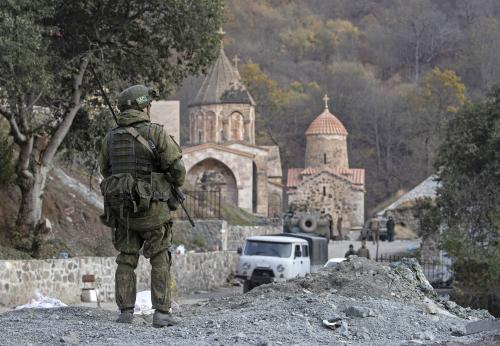Content from the Brookings Doha Center is now archived. In September 2021, after 14 years of impactful partnership, Brookings and the Brookings Doha Center announced that they were ending their affiliation. The Brookings Doha Center is now the Middle East Council on Global Affairs, a separate public policy institution based in Qatar.
Maritime disputes between Greece and Turkey, couched in competing narratives of national sovereignties, are nothing new. Their genesis dates as far back as the founding periods of the two states.
At its core, these disputes center on three issues: the disagreement over the width of Greek territorial waters, along with the ownership of certain islands or isles in the Aegean Sea; the question of the two countries’ respective Exclusive Economic Zones in the Eastern Mediterranean; and the unresolved nature of the Cyprus crisis. In addition to these matters, Turkey also contends that a number of other issues, such as the sovereignty or demilitarized status of certain Greek islands, also remain unresolved and need to be addressed. For its part, Greece rejects these demands outright as a violation of its sovereignty.
Since these disputes are tied to core issues for both countries, concessions and compromises are inherently difficult and politically costly, making their resolution extremely difficult. Plus, the two sides cannot seem to agree on a framework within which to address their disputes: Greece favors international arbitration, while Turkey prefers bilateral negotiations. But even if Ankara agrees to the international adjudication route, only the next dispute will be what is taken to the international court.
Though these details are important, there is nothing new in the story of the Greco-Turkish maritime disputes, nor in their disagreements over frameworks. Plus, in spite of the intermittent flare-ups, these disputes have traditionally taken the form of a smoldering but largely frozen conflict. How, then, to account for the current tensions, which seem to be the longest-lasting crisis in Athens-Ankara relations since Turkey’s military intervention in Cyprus in 1974? Two geopolitical and energy developments, and two sets of systemic changes, are the key drivers of this latest tension.
Triggering factors
The traditional sources of friction between Turkey, Greece, and Cyprus are now dovetailing with another set of interlocking geopolitical tensions and energy disputes in the Eastern Mediterranean. These are between Turkey and a group of countries including France, Egypt, and the United Arab Emirates (UAE). In particular, the energy discoveries in the Eastern Mediterranean and the ever-sprawling Libyan imbroglio have aggravated longstanding tensions. At this stage, not only has the number of countries involved in the Eastern Mediterranean crisis grown, but the scope of the disputes has broadened to include new issues, such as gas exploration and the Libyan crisis.
In the wake of discoveries of gas in the Eastern Mediterranean — by Israel in 2009 and 2010 (Tamar and Leviathan, respectively), Cyprus in 2011, and Egypt in 2015 (Zohr) — the question of how to sell the gas to Europe has become pressing. The Eastern Mediterranean pipeline project was premised on closer cooperation between Greece, Cyprus, and Israel. In January 2020, this tripartite cooperation in Cairo was formalized with the creation of the East Mediterranean Gas Forum. In addition to Greece, Cyprus, and Israel, the forum also includes Egypt, Jordan, the Palestinian Authority, and Italy. However, the envisioned pipeline project and the forum, as well as the regional realignment that underpinned them, have contributed to Turkey’s sense of being sidelined. It has responded with coercive diplomacy, striving to prevent the emergence of an anti-Turkey energy security order in the Eastern Mediterranean.
Likewise, the Libyan conflict has aggravated the situation. First, Libya has become a site of confrontation between Turkey and a set of countries, including Egypt, the UAE, and France. All of these countries have sided with Greece in its dispute with Turkey. France has become the most vocal European power in support of Greece and Cyprus; it has even done military drilling operations with Greece and sent the Charles de Gaulle aircraft carrier to the Eastern Mediterranean in solidarity. Similarly, the UAE signed a defense agreement with Greece.
Second, Turkey signed two memorandums of understanding with Libya’s U.N.-recognized Government of National Accord (GNA) in November 2019: the Delimitation of Maritime Jurisdiction Areas in the Mediterranean Sea and the Security and Military Cooperation Agreement. Through the first agreement, Turkey aimed to disrupt the emerging regional energy and security order: The projected gas pipeline would partially go through maritime areas claimed by Turkey, and the deal conveys Turkey’s intention to disrupt any gas pipeline projects that would circumvent it. The deal also conveys Turkey’s views of its maritime boundaries in the Eastern Mediterranean, but disregards big Greek islands such as Crete and Rhodes, making it shaky from the perspective of international law. With the second deal, Turkey committed to the protection of the GNA in the face of Field Marshal Khalifa Haftar’s (of the Libyan National Army) offensive to take over Tripoli. In a sense, for the GNA, the maritime deal was the price to be paid in order to receive the military cooperation deal with Turkey in return.
Particularly, the Turkey-Libya maritime deal further increased tensions with Greece, and also paved the way for Greece to sign a similar deal with Egypt in August that delimited their respective maritime jurisdictions. Just as the Turkish-Libyan deal conflicts with Greece’s view of its own maritime boundaries, the Greek-Egyptian deal contradicts Turkey’s view of its own maritime boundaries.
Systemic changes: Turkey’s FOREIGN POLICY post-EU accession, and Trump’s world
On top of gas discovery and explorations, as well as the Libyan conflict, two systemic changes have provided the larger backdrop to the current crisis and have made it more perilous.
First, in previous Greece-Turkey flare-ups, the United States has usually intervened. Such spats risk military confrontation between two NATO members — for instance, during tensions over the contested tiny islands of Imia (or Kardak, in Turkish) in 1996, which almost brought Turkey and Greece to the brink of war.
However, in recent years, two trends have become apparent. First, the U.S. has reduced its footprint in the region. This partial retreat did not start with Trump, but rather began under the Obama administration. Trump compounded this trend with another factor, sending the message that this is an everyone-for-himself world. His approach accelerated the decline of international institutions, norms, and principles in the conduct of international affairs. Many powers, including Turkey, adjusted accordingly. The U.S. downsizing of its role in the region, coupled with Trump’s such view of international affairs, has set off scrambles amongst different regional players for more influence and power in the Eastern Mediterranean and broader Middle East and North Africa region.
Second, Turkey-Greece relations are unfolding against the larger backdrop of the European framework. The honeymoon period between Ankara and Athens during the late 1990s and 2000s was a natural outcome and requirement of Turkey’s European Union (EU) accession vision and process at the time. This was the primary reason for the Turkish government’s strong support for the U.N. plan that was put to a referendum in Cyprus in 2004, on the unification of the island. Turkish Cypriots voted 64.9% in favor of unification, whereas Greek Cypriots voted by 75.83% against. However, Turkey’s EU accession process and aspirations have long come to a standstill, which has in turn hurt Turkish-Greek/Cypriot relations.
The way forward
President-elect Joe Biden’s victory has led to euphoria, if not complacency, in Europe. But Biden is unlikely to resume America’s post-World War II role as the policeman in the European neighborhood and the world at large. He is equally unlikely to increase the U.S. security commitment to the region. As Europe expert Daniel Hamilton puts it, Biden “will demand more, not less, of Europe” in foreign and security policy. This, in return, means that it falls squarely upon the Europeans to prevent the Eastern Mediterranean crisis from getting out of hand — as of now, a conflict is unlikely, but not unthinkable. In the end, this is not only a crisis in Europe’s neighborhood, but also a crisis within Europe, given the deep involvement of three EU member states, namely Greece, Cyprus, and France.
In this respect, German-led European diplomatic efforts to de-escalate the crisis are a step in the right direction. However, the future prospects of these efforts will be contingent upon a sharp diagnosis of the crisis, as well as patience, commitment, and imaginative policy responses. Even more importantly, they depend on Germany and France patching up their divergence on the subject. Although there are multiple files and actors in this crisis, its core remains centered on multi-layered maritime disputes between Turkey, Greece, and Cyprus. The effort to de-escalate the tension should also start by focusing on re-starting talks between Greece and Turkey. The expectations need to be kept modest. Instead of conflict resolution, the present conditions at best only allow for conflict management. And in Greece-Turkey disputes, talks usually indicate de-escalation, as they take the focus from coercive diplomacy and military posturing towards dialogue and negotiations.
However, for talks to start, it is equally critical that there is a form of moratorium on energy exploration in the disputed waters in the Eastern Mediterranean. As of now, Turkey is almost the only one that undertakes these activities. To reinforce this process, Europe should push for Turkey’s inclusion in the Eastern Mediterranean Gas Forum. Ankara’s recent push for a modus vivendi with Egypt and the reported outreach to Israel to mend these ties also appear to aid this process. If this route is not viable, Europe should then push for a trilateral framework between Turkey, the Eastern Mediterranean Gas Forum countries, and the EU in order to discuss and address the crisis in the Eastern Mediterranean.
Though the gas discoveries triggered the recent tension, this crisis is essentially political. In addition, despite the early optimism about the size of the gas reserves and its potential monetization, it now appears that the gas reserves are smaller and less lucrative, making the projected Eastern Mediterranean gas pipeline project to Europe highly unfeasible. Plus, European energy transition and decarbonization goals mean the commercial value of the gas riches will further diminish going forward. This can potentially open an avenue for conversation between the EU and littoral states of the Eastern Mediterranean on energy transition and decarbonization in the European neighborhood, as well. For this to happen, the EU needs to advance a major decarbonization vision for the European neighborhood, a plan to implement it, and a commitment to achieve it. At present, given the division within Europe and disagreement amongst Middle Eastern states about the nature of the regional order, such a grand plan might not resonate widely. But even an official-level exploration and conversation on the subject can direct the nature of the conversation on the Eastern Mediterranean more towards a cooperative mode. This in itself can help reduce the tension.
Finally, Turkey’s deepening economic ills, coupled with the prospective trans-Atlantic convergence between the EU and the Biden administration on the Eastern Mediterranean, is likely to motivate Ankara to de-escalate the situation in the area. Europe and the U.S. should seize this window of opportunity, which may not arise again for a long time to come.
The Brookings Institution is committed to quality, independence, and impact.
We are supported by a diverse array of funders. In line with our values and policies, each Brookings publication represents the sole views of its author(s).










Commentary
Is there a new window of opportunity in the Eastern Mediterranean crisis?
December 9, 2020